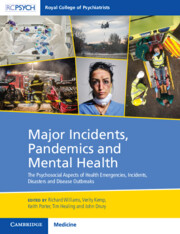 Major Incidents, Pandemics and Mental Health
Major Incidents, Pandemics and Mental Health Book contents
- Major Incidents, Pandemics and Mental Health
- Major Incidents, Pandemics and Mental Health
- Copyright page
- Dedication
- Contents
- Figures
- Tables
- Boxes
- Contributors
- Foreword by Dr Adrian James
- Foreword by Professor David Lockey
- Section 1 The Nature and Impacts of Twenty-First-Century Healthcare Emergencies
- Section 2 Clinical Aspects of Traumatic Injuries, Epidemics, and Pandemics
- Section 3 The Role of the Public in Emergencies: Survivors, Bystanders, and Volunteers
- Chapter 19 The Role of the Public: Understanding Group Processes in Emergencies, Incidents, Disasters, and Disease Outbreaks
- Chapter 20 Social Identity and Traumatic Stress in the Context of an Earthquake and a Pandemic
- Chapter 21 Mobilisation and Deterioration of Social Support Following Disasters Resulting from Natural and Human-Induced Hazards
- Chapter 22 Collective Responses to Terrorist Attacks
- Chapter 23 Collective Psychosocial Resilience as a Group Process Following Flooding
- Chapter 24 Facilitating the Public Response to COVID-19
- Chapter 25 The Social Psychology of Mass Casualty Decontamination in Chemical, Biological, Radiological, or Nuclear (CBRN) Incidents
- Chapter 26 Factors That Determine Wider Solidarity Responses After a Major Incident or Disaster
- Section 4 Responses to Meet the Mental Health Needs of People Affected by Emergencies, Major Incidents, and Pandemics
- Section 5 Sustaining and Caring for Staff During Emergencies
- Section 6 Designing, Leading, and Managing Responses to Emergencies and Pandemics
- Section 7 Key Lessons for the Way Forward
- A Glossary of Selected Key Terms Used in This Book
- Index
- References
Chapter 22 - Collective Responses to Terrorist Attacks
from Section 3 - The Role of the Public in Emergencies: Survivors, Bystanders, and Volunteers
Published online by Cambridge University Press: 11 January 2024
- Major Incidents, Pandemics and Mental Health
- Major Incidents, Pandemics and Mental Health
- Copyright page
- Dedication
- Contents
- Figures
- Tables
- Boxes
- Contributors
- Foreword by Dr Adrian James
- Foreword by Professor David Lockey
- Section 1 The Nature and Impacts of Twenty-First-Century Healthcare Emergencies
- Section 2 Clinical Aspects of Traumatic Injuries, Epidemics, and Pandemics
- Section 3 The Role of the Public in Emergencies: Survivors, Bystanders, and Volunteers
- Chapter 19 The Role of the Public: Understanding Group Processes in Emergencies, Incidents, Disasters, and Disease Outbreaks
- Chapter 20 Social Identity and Traumatic Stress in the Context of an Earthquake and a Pandemic
- Chapter 21 Mobilisation and Deterioration of Social Support Following Disasters Resulting from Natural and Human-Induced Hazards
- Chapter 22 Collective Responses to Terrorist Attacks
- Chapter 23 Collective Psychosocial Resilience as a Group Process Following Flooding
- Chapter 24 Facilitating the Public Response to COVID-19
- Chapter 25 The Social Psychology of Mass Casualty Decontamination in Chemical, Biological, Radiological, or Nuclear (CBRN) Incidents
- Chapter 26 Factors That Determine Wider Solidarity Responses After a Major Incident or Disaster
- Section 4 Responses to Meet the Mental Health Needs of People Affected by Emergencies, Major Incidents, and Pandemics
- Section 5 Sustaining and Caring for Staff During Emergencies
- Section 6 Designing, Leading, and Managing Responses to Emergencies and Pandemics
- Section 7 Key Lessons for the Way Forward
- A Glossary of Selected Key Terms Used in This Book
- Index
- References
Summary
This chapter helps to further develop the novel theoretical notion of collective psychosocial resilience in the face of danger, whereby emergent cooperation can happen not solely despite a terrorist incident, but also because of it. It examines how the public contribute prior to professional responders arriving, and how they might be involved actively at the scenes of emergencies, incidents, disasters, and disease outbreaks (EIDD). Greater understanding of the realities and their potential by professional first responders should enable emergency planners to develop practical strategies to optimise the interventions required by survivors.
- Type
- Chapter
- Information
- Major Incidents, Pandemics and Mental HealthThe Psychosocial Aspects of Health Emergencies, Incidents, Disasters and Disease Outbreaks, pp. 154 - 159Publisher: Cambridge University PressPrint publication year: 2024
